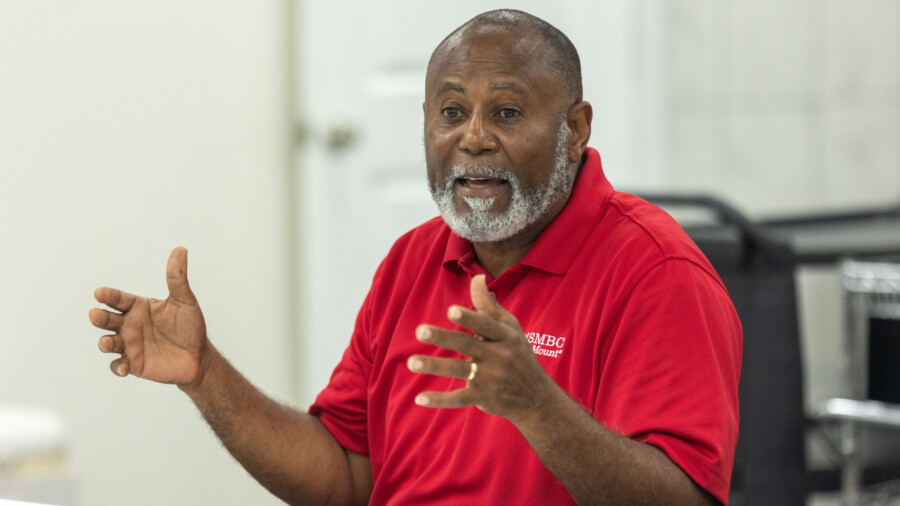Tyler Gibson feels he will be forced to learn falsehoods.
The 12-year-old Springfield resident was the only child who sat in a community meeting held at Mount Sinai Missionary Baptist Church on Monday night — a meeting that Mt. Sinai Pastor R.L. Gundy called in response to Florida’s much maligned new standards for teaching African American history.
Gundy recently resigned his position as a history teacher at Ribault Middle School because he felt uncomfortable teaching the standards, he says. Tyler says the idea that middle school students like him will learn that enslaved people benefitted in any way from their bondage is upsetting.
“I felt lied to because what they are teaching me is not the truth,” Tyler says.
The standards say students in grades 6-8 should have instruction that includes “how slaves developed skills which, in some instances, could be applied for their personal benefit.”
Tyler’s mother, LaTonya Thomas, has taken him to the Ritz Theater to learn local Black history and to voting rallies in Springfield to impart how Black Jaxsons fought to secure voting rights.
The goal, she says, is “seeing the art, the history (and) just knowing that you come from somewhere of value — not hearing the stereotypical things on the news or looking at the crime — you can see power, royalty, achievement that can be obtained.”
The mother and son were among nearly two dozen people who gathered at Mt. Sinai’s fellowship hall in Springfield Monday to talk about how the Jacksonville community could fight against the new standards. They plan to continue strategizing how best to direct their protest.
Since 1994, Florida has mandated that African American history is taught in elementary and secondary schools. After Florida passed the Stop W.O.KE. Act last year, the Florida Department of Education created an African American History Standards Workgroup to formulate a new “strand” of Black history instruction across all grade levels. Like all curricula, the new standards had to align with the state’s new prohibitions, including no teaching that certain people “must feel guilt, anguish, or other forms of psychological distress because of actions in which the person played no part, committed in the past by other members of the same race, color, national origin, or sex.”
2 local connections to the disputed standards
“This was a collaborative process, a deliberative process, and the result is a consensual agreement,” Florida African American History Standards Workgroup member William Allen told NPR last week.
Allen is a Fernandina Beach native and professor emeritus at Michigan State University.
In a statement from the Florida Department of Education defending the standards, Allen said critics have reduced the workgroup’s three-month effort to “isolated expressions without context.”
After Vice President Kamala Harris spoke out against the standards in Jacksonville last month, Gov. Ron DeSantis this week retorted with a letter, inviting Harris to meet with Allen to have what the Republican presidential candidate called “a serious conversation on the substance of an important issue.”
At the Ritz Theatre, Harris had asked, “How is it that anyone could suggest that in the midst of these atrocities, that there was any benefit to being subjected to this level of dehumanization?”
Rep. Kimberly Daniels, D-Jacksonville, who sits on the state’s African American History Task Force (a separate body from the workgroup that created the standards), agrees with Harris that it’s wrong to teach that enslaved people benefitted from learning skills.
Daniels says her lived experience, as a native Jaxson who grew up in the 1960s, makes her old enough to remember Duval County Public Schools’ desegregation. She became an at-large City Council member in 2011 before being elected twice to the state House of Representatives.
Daniels is one of six new members of the African American History Task Force appointed over the last 90 days. She says the Task Force was not given the chance to review the standards before they were released, and she would have spoken out against them if they had.
“That’s our responsibility as a task force: to communicate with the Department of Education and to make sure that we’re not just taking blurbs out and saying one, small thing and that people get the whole picture of what they need to understand about slavery,” Daniels says.
She says now she wants to use her position on the body to correct the standards.
“I think there was some good work and we don’t want to throw that away. …Now, we get to work and go through the whole curriculum,” she says.
Jacksonville history in the standards
In addition to the piece that’s attracted national outrage, the new 216-page social studies standards include multiple references to Black history in Northeast Florida.
- High school students should learn “how Spanish-controlled Florida attracted escaping slaves with the promise of freedom.”
- Fifth-graders will learn about the “experiences and contributions of African Americans in early Florida,” including the Fort Mose and Lincolnville communities in St. Augustine.
- The events of Jacksonville’s Ax Handle Saturday and in St. Augustine in the summer of 1964 are both topics for high school teaching
- High schoolers will also learn about William Pope Duval, Florida’s first territorial governor — and Duval County’s namesake — as well as the state’s first elected governor, William Dunn Moseley, who retired to a Palatka plantation after his term. Both men enslaved people.
Duval County is better than most in the state when it comes to teaching African American history, according to state education officials. This year, Duval County Public Schools was the only district in Northeast Florida with a Black history curriculum recognized as “exemplary” by the commissioner’s African American History Task Force.
Still, Gundy says he resigned because teachers don’t have enough guidance from the school district about what books and references can be used in adhering to the new standards. Based on what he did know, he didn’t feel comfortable.
“I’m a pastor,” Gundy says. “I’m not going to lie to the kids.”
Gundy also thinks the standards should include more figures in local history, like athlete and civil rights crusader Rutledge Pearson.
“A lot of famous people came out of here who changed the world,” Gundy says, after casually mentioning that Henry Aaron’s mother-in-law, Willie Mae Lucas, was his kindergarten teacher. “That’s why they are so hard on Duval County. …You only know the story that people tell.”
Lead photo: R.L. Gundy is the pastor of Mt. Sinai Missionary Baptist Church. He taught at Ribault Middle School before resigning his position over the Florida Department of Education’s social studies standards that were released on July 19, 2023. | Will Brown, Jacksonville Today







